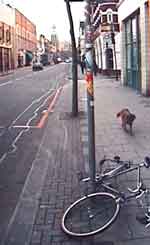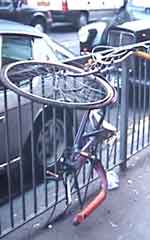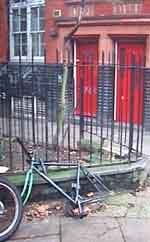BICYCLE THIEVES
MARK IT TO KEEP IT



The worst thing about having your bike stolen is to know who`s got it and not have the right to have it back. The law seems to protect bicycle thieves more than cycle owners. You can pay good money for your bicycle, ride it for years, but if you are not cautious one day someone may say it`s theirs, not yours.
I knew I had to leave the bike in a busy well-lit place and I`d read that it`s better to use two different locks to give the thieves a hard time. And so I did. But on New Year`s Day the light of the lamp-post where I chained my two-wheeler was only illuminating my two locks, left forlornly on the pavement outside a crowded restaurant. I didn`t report the fact to the police because I thought my bike was gone for ever.
One month later, whilst I was walking along Upper Street in North London I saw my bike ! It was locked to a traffic sign. I got excited. "What should I do?" I checked and checked again. It was my mountainbike. You know your bicycle. Especially after 7 years spent together up and down hills and through the countryside, after all the punctures that I`ve repaired, and the work I`ve done on my own. The idea of a twin bicycle came to my mind. No way. The sticker of the bicycle shop where I bought it was still there - on the frame. What`s so strange ? The shop is in a small village near Florence.
Police. When you need them they are never around. I crossed the road, and always keeping an eye on my cycle, called '999'. "Don`t leave the telephone box, we have located you, some officers are on their way." I was happy at the idea of having found my bike. Two bobbies passed by. I explained the situation. I described the bike and when I saw a guy unlocking the bike, the officers crossed the road and stopped the guy.
They questioned him and his answers were enough for them to let him go with my bike. He was a French student who had bought the bike from Brick Lane Market in London for £ 50 two weeks earlier. So they turned to me - "In his limited English we believe he is in good faith." There was no crime and because I hadn`t reported the theft at the time they couldn`t refer to any criminal record either. They could do nothing - it was a civil matter.
"Supposing we go to that market, do you think the thief is still there waiting for us ? We are not going to waste our time on a £ 200 bicycle," was their line. I couldn`t believe it. Who is supposed to investigate crimes ? Is stealing bicycles a crime or what ? That guy was riding a stolen bicycle. And when I suggested that maybe they could question the bike seller from the market, one of the two bobbies replied sarcastically, "thank you for your tip!"
I contacted Cycle AID - a free cycleline tel. 0800 387815- for advice and
Mr. Michaeo Blair, an ex Northen Ireland PC, remarked that here in England investigation
is not compulsory and that just to open a civil trial would cost me around £
80 in a county court, and even then there was no guarantee of winning the case.
He further explained that a photo wasn`t enough to establish the ownership of
the bike. Maybe a frame number could help. So I called the shop where I bought
the bike and they said my bicycle didn`t have a frame number because bicycle
companies have only recently started to write numbers on bike frames.
Since as a normal citizen I could achieve nothing, I put my journalist hat on
to find out how could I get my bike back and what the police do to catch the
bicycle thieves. I got a press release from Islington Police, which covers the
area where my bicycle was stolen. "In 1997 less than ten per cent of pedal
thieves were arrested", said PC Fred McCormack of the Crime Prevention
Desk, "and less than five per cent of the pedal-cycles are actually returned
to their rightful owners because they can no longer be positively identified."
The majority of the bicycle-related arrests are for other reason then the ownership of the pedal-cycle - like cycling on the pavement (£ 20 fine). If the officers suspect they are dealing with a stolen item, they can take possession of the bike under the Police Property Act, bail the person and try to discover where the bike came from - this is the tricky bit.
There are lots of systems to trace the owners, if the bikes are firstly marked and registered. A very simple low-cost but effective method used by the Police to identify bicycles is postcoding the frame using a UV (invisible) marker pen. The latest system is Datatag - a coded microchip transponder or 'tag' (circa £ 20) hidden inside the bicycle frame. When scanned by a hand-held scanner, the tag transmits its unique identification number.
Not everybody report the theft. "It make it much easier for us if we can relate to a crime originally reported. We can find the legitimate owner, return the bike and charge the thief", added PC McCormack. "We have a computerised system and chemical treatments to bring the mark back, but if we cannot prove the origin of the bike we have to give it back to the thief, or we can keep the bike at the police station where people can come and identify the stolen property. Ultimately we get rid of them at auctions."
Was it just a coincidence that my bicycle ended up in Brick Lane Market ? Inspector Oliver Perry from the Press Liason Office of Bethnal Green Police station, which covers the area of the market, confirmed my suspicions.
"We have police officers posted down there every Sunday and they regularly arrest people for stolen goods, and bicycles are no exception. A lot of this is actually brought to our attention by purchasers who suspect a bike might be stolen because the frame number is rubbed out or filed down. But nothing seems to indicate that anybody is selling stolen bikes on a regular basis out of that market.
If you buy anything from markets such as Brick Lane in London, where people sell whatever they`ve got, you`ve got to exercise extreme care. Less care when buying from licensed sellers rather than unlicensed traders. Less care when buying new bikes. Less care when buying from a chap who has 100 bicycles than one with two bikes in a corner. I`d suggest it might be stolen. So watch out ! Make all the queries you can and check the frame number with the police.
Traders don`t have to prove where they got the bike from. They should do ! If we ask them the history of the bike they can tell us 'I don`t know' or 'I got it from a friend of mine'. Any receipt they may show can be made up. Because in this country identification cards don`t exist, anybody can give any name they like. It is up to you to check you are not buying a stolen item.
If you know it`s stolen, you commit a crime, if you think it`s stolen, you commit a crime, but if you don`t know it`s stolen and there is no indication by the cheapness of the price, or by other things that it`s obviously stolen, you don`t commit an offence. All you do is run the risk of the bike being taken off you by a police officer and an investigation launched into why you got it. Provided you can give a reasonable answer - which often is 'I bought it from a bloke in Brick Lane Market, I paid £ 70' - a reasonable price for a second-hand bike - then obviously you will not get any problems. Fair price, fair goods - and you will fairly turn to a magistrate and say, ' yes, I know I got it cheaper but that`s why I go to the market.' "
Just when I started to be convinced that this crime is very difficult to fight, I came across the Police Cycle Operation which used stolen bicycles to catch general criminals. On his own initiative, a Northallerton Police constable, John Trueman had bought a mountain bike and specially adapted to accommodate a tracking device. I called him.
"It`s very difficult to catch a burglar or someone breaking into a car" - said PC Trueman. "You never know where the burglar will strike. However it`s very easy to track someone who has stolen a bicycle. Firstly they do not have to prepare the crime for days or carry special tools. Most of the time for them it`s just taking an unlocked bike and riding away. My idea is to put a brand new bike out as bait. We let them steal the bike - once we waited only five minutes - the tracking device then leads us to their house or wherever they are holding other stolen goods. By using trackers on bikes we have arrested not just bike thieves but drug dealers, burglars, handlers of stolen goods and serious auto-criminals."
This tactic has worked 90 per cent so far. Other police forces have notched up even greater successes. After following the tracker bike for six hours, the Metropolitan Police recovered 18 stolen mountain bikes and £ 30,000 worth of cannabis.
PC Trueman, 31, has been honoured for his 'professionalism, enthusiasm and innovative planning' and presented with a Divisional Commander`s Commendation. "We need to be a bit more devious and pro-active to beat the criminals at their own game. If we can protect property and people`s lives and at the same time reduce theft and make life harder for criminals and catch them doing things they don`t expect to be caught for, well and good. Being a police officer is not just walking down the street in an uniform."
I want to propose him as the 'Bike-Thief-Busting-Super-Bobby' of the Year. Ceasing after bicycle thieves is definitely not a waste of time for him.
What`s very funny in all this story is that I keep seing my bicycle locked at that pole. The new owner works somewhere around that pole. I`m always tempted of stealing it back, or chaining it with a huge U-lock. How could he then demonstrate it`s his bike ? Or maybe he would - perhaps he has already post-coded it.
felix petrelli